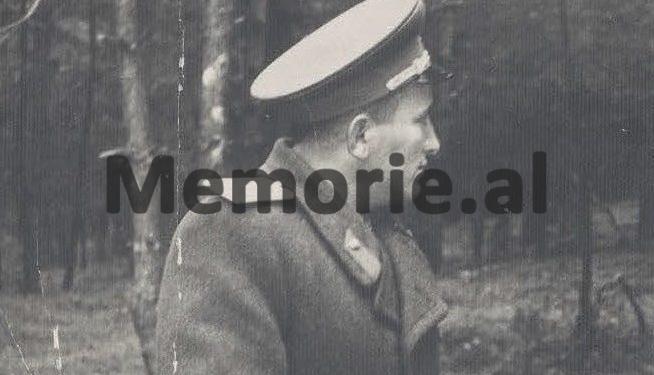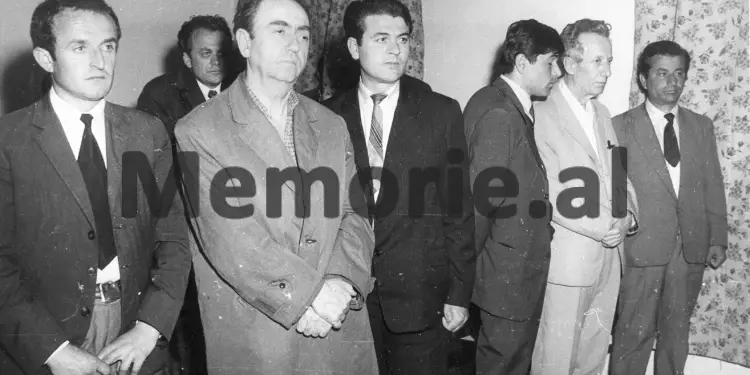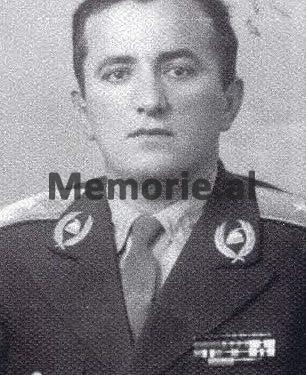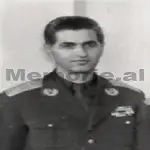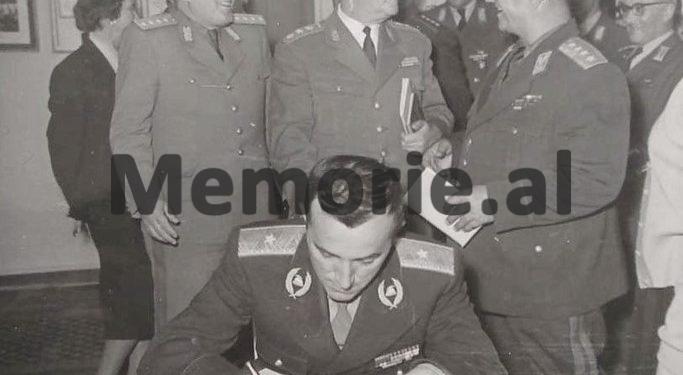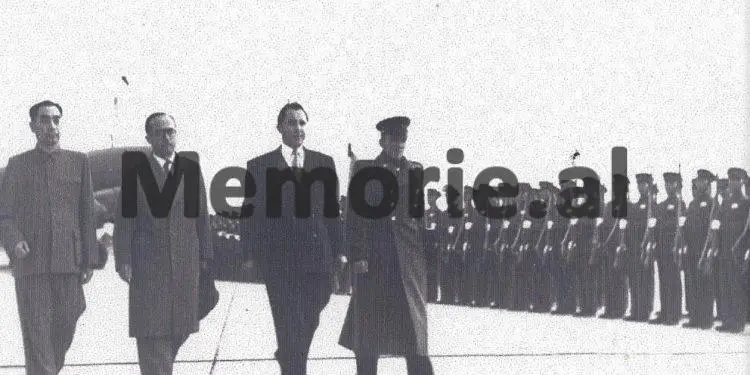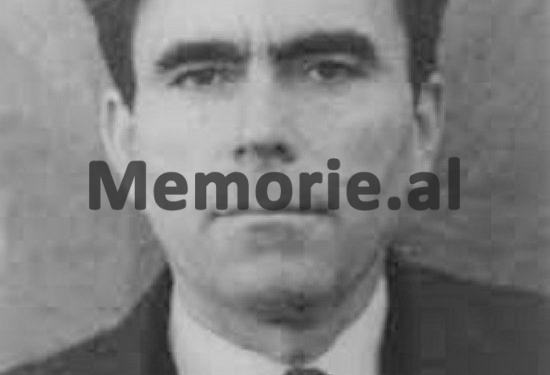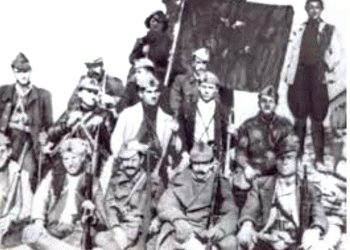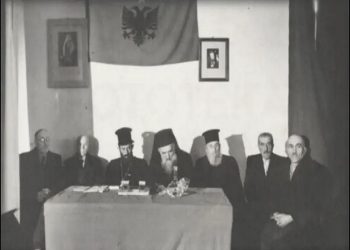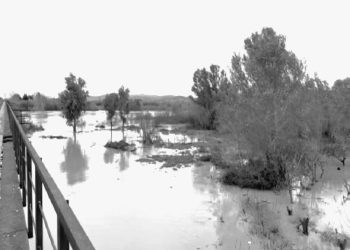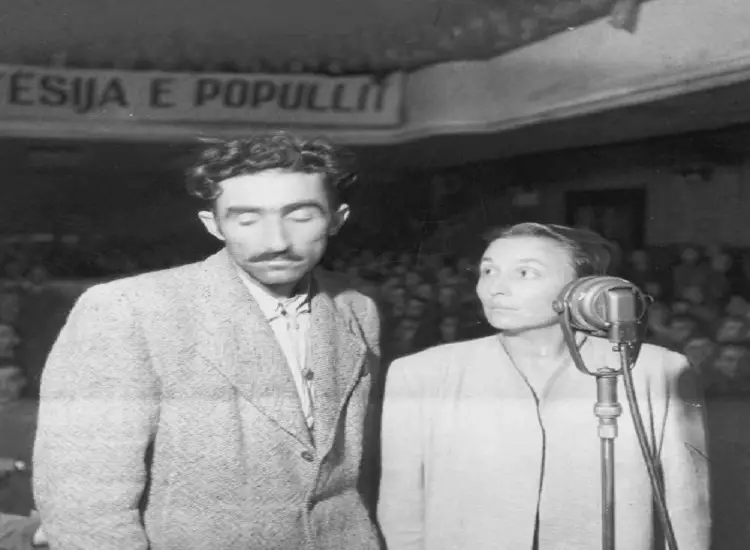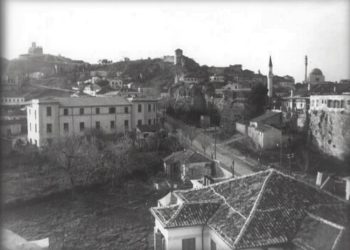By Halim Ramohito
The first part
“In the meeting room, I, D. Mamaqi, S. Bekteshi, P. Dumes, H. Çakos and Rr. Parllaku, we were close to I. Sina and some of the Security, such as…”/ Memoirs of the former general, for the plenum of the K.Q. of PPSh, December 16, 1974
Memorie.al / Halim Ramohito, one of the remaining former generals from the group of soldiers who were arrested and exiled as the “coup group” of 1974, by Enver Hoxha. At the head of this group was Beqir Balluku, and behind him, the most honorable caste of soldiers of the time, among them General Ramohito, who, after participating in the ranks of the National Liberation Army, had served as a representative of Albania and as a military attaché in The Treaty of Warsaw’. A witness to the break with the Russians, Ramohito would later become a witness to the destruction of the Albanian army by the dictator Hoxha, who showed that during his stay in power, he did not want qualified people around, but only servile ones. Ramohito, calm and with the coldness given to him by the distance of time, took out and published his memoirs, without which perhaps the history of that time with the “coup group” would not be complete, and might even be written crookedly or deformed …!
With a rare sincerity, he recounts his feelings during the infamous meeting of the PPSH Central Committee, where the military caste of the time, led by Beqir Balluku, were expelled from the party, then arrested and exiled for years. Even though he had to take off his jacket gradually, to work the land like a farmer in the long exile, even though he had to stop seeing his mother even in death, his biggest hostage, the “self-criticisms” that he had to, for the sake of the party. “Enveri killed us even with our own hands…!
However, even my acceptance of any baseless accusations of so-called guilt and mistakes that I and any of my friends might have made, have remained and will remain a nail in my heart until I die. I don’t want the earth to digest this great worry and I don’t forgive myself for this!”, – writes Ramohito, in the first part of his memoirs, “In the service of my Motherland”, published by “Grand-Prind”. Below is published a part from the chapter “My ordeal and that of the whole family in the years 1974 – 1990” and precisely the moment of the start of this ordeal, from the hall of the PPSH Central Committee.
In the meeting hall of the Central Committee of PPSH
“In a figurative sense, but not only in this sense, it was not a simple meeting hall, but the real scene of some of the worst tragedies in the history of the party and our people, after 1944. Of course, they were crossed there; Bedri Spahiu and Tuk Jakova, Liri Belishova was accused there, as “an agent of the Soviets and a close associate of Nikita Khrushchev”, there the diabolical idea of including Fadil Paçrami, Todi Lubonja and Agim Mero, in the hostile group in the field of art and culture.
Petrit Dume, Hito Çako and Rrahman Perllaku were tried and arrested there, I would also be expelled from the ranks of the Central Committee and the Labor Party, Abdyl Këllezi, Koço Theodhosi were also tried, convicted and arrested there. and Kiço Ngjela, there was the “de facto” trial of Mehmet Shehu, who, being sure of what would happen the next day of the meeting, preceded his end with a bullet in the temple, there the fatherhood with Kadri took place Hazbiu, Feçor Shehu and Llambi Ziçishti…!
Everything was designed, started and finished there. In that infamous building, in that ghastly hall. And everything was concocted only by a diabolical mind like that of Enver Hoxha, this inimitable actor, tragedian and comedian, who would be the envy of authors, directors, screenwriters and tragic and comic actors of all time. With these gloomy feelings and thoughts, I was walking that day towards the Central Committee building.
Of course, then I did not have the perception that I have today, a thread of hope, a light at the end of the tunnel, that kept me that things could not go wrong until the end, that the heads of people with so many contributions to the war and to the construction and protecting the country, they could not be cut like heads of cabbage. I was hoping that someone would finally remember, stand up and say: “Enough, we’re overdoing it…! We are taking innocent people by the neck. We are eating each other, as the octopus does with its young…”!
But what happened on that black day overturned all my hopes and caused a great earthquake in everything I had loved, believed and dreamed of; in everything I had fought and worked for in dozens and dozens of years…! Meeting of the VI Plenum of K.Q. of PPSH was scheduled to take place on December 16, 1974, at 10:00 a.m., precisely in that “famous” meeting hall, which was located on the third floor of the Central Committee apparatus building. I got in at 9.45.
There I saw – as it seems they had been announced before – that all 57 members of the Central Committee and its 40 candidates had taken their seats. As rarely before, all the first party secretaries of all districts, as well as many cadres of the Central Committee apparatus, were participants in this meeting. Surprisingly, as it had never happened before, the place where I was supposed to sit was already reserved. He was somewhere, on the left side of the hall.
Together with Dilaver Poçin, we were among them, Ibrahim Sina, chairman of the Control and Revision Commission of the Central Committee and Detar Avdija, head of the Military Sector in the apparatus of the K.Q. Sadik Bekteshin, together with Dashnor Mamaq, had been placed near the door, on the right side of the hall. And Petrit Dumen, Hito Çakon and Rrahman Parllaku, they had placed them on the left side of the hall, somewhere in the middle.
To my surprise, but not only mine, each of these three had been put in the middle and guarded the steps in the meeting, officers of the Ministry of the Interior, some even known to us. As it seemed, the determination of the places where we should sit in this meeting, had been thought from before to the details, as part of the scenario that would cross us and lead us on a path of no return.
The director wanted to be sure down to the details, perhaps even out of paranoia and fear (how ridiculous this sounds!) of some momentary diversionary action by us, the participants of the so-called “coup group”. On the other hand, our premeditated separation and placement in the hall, I think, was also done for the other fact, so that all the members of the plenum of the Central Committee could be more easily oriented during the voting, which of us should be arrested in the hall and who it had to remain momentarily, only with punitive measures.
And, in fact, that’s what happened. I sat silent and confused by this tragicomic act, already anticipating what was about to happen. And it was a fact that, at the meeting, when Enver Hoxha asked the members of the Central Committee, which of us, the so-called “putschists”, should be arrested, the participants were easily oriented and stood up one after the other, they spoke as if in a chorus, that they saw that Petrit Dume, Hito Çako and Rrahman Parllaku were each guarded by two Security officers, while for us, the rest, the measures this time were different, a little “easier”.
I have been told that, on both entrance doors of the meeting hall, devices for the control of metal tools were also installed in advance. All this masquerade, together with the fact above and many others, such as; for example, not allowing each of us to read the written discussions or to give explanations about the accusations against us, etc., was directed by Enver Hoxha himself from the presidium, nervous and constantly making movements.
That this meeting of the 6th Plenum of the Central Committee would take those extraordinary decisions is also proven by the fact that, at first, there was not only absolute calm in the hall, but also concern and sadness, while later, it was passed by the participants in it shouting hate at us. Despite the fact that several decades have passed, I can never forget those sad scenes, when I saw my old comrades from the War and from the leadership work in the army for the last time as they passed very close to me, as if under arrest.
But, in his closing speech on December 17, 1974, Enver Hoxha evaluated this entire masquerade trial (no more and no less), saying with cynicism: “The history of humanity, from the most ancient times until today, the history of any revolution has not known a trial of traitors, like the one that is being done to them today in socialist Albania. It is an open trial, – Enver Hoxha dares to say, – for all the people and that have continued for six months, and the entire coup plotters, – he continues to deceive, – have been free and not arrested…”!
And, these words were said when, in fact, we were all temporarily suspended from our ministry duties, when we were not allowed to participate in the preparation of the parade, on the occasion of the 30th anniversary of liberation, when our homes day and night, they were strictly monitored, when we were followed by Security employees at every step, until the meeting of the Central Committee plenum, when our phones were tapped without interruption, etc. As planned, the meeting of the plenum began at 10:00, with Enver Hoxha himself coming to the presidium first, received with ovations by those present.
Standing alone, from the presidium of the meeting, he communicated the agenda: Report of the Political Bureau “On the conclusions that emerge from the discussion in the party, army and field about the hostile activity of Beqir Balluku, Petri Dumes, Hito Çakos, etc.”! And since the report has been read by all, he said, let the discussions begin. First, the floor was given to Petri Dumas, since Beqir Balluku was not given the opportunity to participate in this plenum meeting. For this, Enver Hoxha solemnly announced to the meeting that he was interned in Roskovec and that, there, that day, he had been arrested.
I was given the floor after Dashnor Mamaqi, but as soon as I started, I was interrupted by Enver Hoxha himself, supported by the hysterical screams of all the participants. In these memoirs, I have tried to acquaint the reader with facts and documents, clearly proving that, in fact, in 1974, there was no “military coup”. I have tried to acquaint the reader with the reasons why, in my opinion, Enver Hoxha fabricated this human massacre, which, as is known, cost a lot not only to our Armed Forces, but also to the whole country, not to mention our lives, our families and relatives for 16 years in a row.
On the recommendation of my fellow villager, Sinan Gjoni, former political secretary of the first District Committee of the Communist Party of Vlora district, in January 1943, when I turned 18 years old, I was accepted into the ranks of the Communist Party organization of Vlora. Like many young people, my friends from the village of Tragjas, the Commercial High School and the city of Vlora, and others, I too, full of enthusiasm and youthful dreams, without any career interest and material benefit, started the long road and difficult war, for the liberation of the country and work in the army for the defense of the homeland.
But, at 12:00 on December 16, 1974, after 31 years, at the age of 49, at the meeting of the 6th Plenum of the Central Committee of the Labor Party of Albania, Enver Hoxha, who, for 44 years in the party and instead, he himself wrote and stamped himself, standing up and venting his anger and hatred, for motives mainly invented by him and his lackeys, he communicated to the meeting: “It was decided anonymously, the exclusion of Halim Ramohito from the Central Committee and from the party!…”!
Although previously J.P., a member of the Central Committee, had proposed my exclusion, only from the Central Committee, Enver Hoxha “forgot” this proposal and hesitated to put it to the vote, and the reason was clear: He had already decided, that three of the generals should be arrested in the hall, while the rest of us would be expelled for the moment, not only from the Plenum of the Central Committee, but also from the party.
In those moments, from where I was, I listened with sadness to the barrage of provocative questions and persistent requests that were made to me from the hall, to admit that I was also an important member of the headquarters of the “coup group”, that for this alone, I must to speak and admit that it was a “military coup” and that I was one of the participants in it. In this serious spiritual situation, I barely heard the words that Enver communicated to the room about my punishment, not even allowing me to read the written discussion, under the pretext that; “the things I would say, my friends know…”!
Then, like everyone else, Enveri asked me to leave the meeting hall after handing over the party card. Shocked and depressed as I was at those moments, I saw Enver standing, taking the pose of a tragic actor, while all the other participants in the hall appeared to me as if in a fog, with their deformed faces, where there was only hysteria and unbridled hatred.
Enveri presented this procedure of holding the meeting, leaving us from the hall before the sessions were completely finished, as a new innovation of his, unlike those of all the previous meetings of the Central Committee plenums. Like the others, S. B., a member of the Central Committee, was waiting for me at the exit door of the meeting hall, responsible for handing over the party’s thesis. Unfortunately, I didn’t have anything to deliver to him, because I didn’t have the document with me, since I never thought that the matter could reach that meeting.
General Ethem Gjinushi, a few days ago, had told me: “In the apparatus of the Central Committee, a group has been created to collect data for measures, even proposals for arrests, especially for us, the main leaders of the army”! Although Ethemi assured me that he was sure of this fact, since his fellow villager N. C., an employee in the Central Committee apparatus, had told him in good faith, I did not believe him.
It never occurred to me that at the meeting of the Central Committee Plenum, such decisions about arrests would be made, as I considered it to be nonsense, which could not happen directly in a forum. I didn’t even think about the fact that such a thing had never happened before and that the decisions to make arrests, I thought, belonged to the Political Bureau, through the Ministry of the Interior.
Crushed morally and physically, after having several sleepless nights, I descended the stairs of the three floors of the Central Committee apparatus building. I saw with indifference the faces of armed soldiers, known and unknown, moving quickly through them. At the former Lulishtja, in front of the Central Committee building (now the “Rogner” hotel), I saw many armed policemen standing by. All those dozens of armed men, it seemed clear, had been deployed long before, apparently to guard us, six former members of the Central Committee, designated as enemies.
Walking along “Dëshmorët e Kombit” Boulevard, towards the building of the Ministry of Defense, it seemed to me that the many citizens who were walking by me, all saw only me. At the entrance of the ministry building, the first person I met was my old war friend, former general Vehbi Hoxha. He knew that the Central Committee was meeting that day precisely for our work and, worried, he immediately asked me: “How did you get out of the meeting”?! I explained to him what happened, that the “iron broom” swept us all away!
Immediately, Vehbiu answered me very worried: “What is this nonsense that is being done…?! Well then, now, with the liquidation of the generals, our leaders have no choice but to form a cooperative of captains, to command the army…”! I went into the ministry building, to my office in the Political Directorate, took the party certificate from the safe and handed it to D. SH, secretary of the organization – base of the party of the Political Directorate of the Army.
The functions of the former Political Directorate of the Army, created as early as 1947, Enver Hoxha then assigned to the apparatus of the Central Committee, and the Directorate of Culture and Propaganda that followed it, remained in the Ministry of Defense, with only cultural functions in army and without any right to give instructions and directives in the name of the Central Committee as before. Even for the merger of the Political Directorate, as for any other problem, especially in that situation, only Enver Hoxha decided.
And he, this decision in those days, argued with the fact that she; “he only had the name as the Director of the Central Committee, that, in fact, he was led by revisionist enemies”. When I found out about the liquidation of the Political Directorate, I remembered an event from many years ago (in 1947) in the army, when a battalion commissar in the infantry regiment in Pogradec, destroyed even the soldiers’ necessities, for the reason that in them hostile slogans were written. And that poor man, in order to relieve himself from the work of sweeping them every day, completely destroyed the walls of the needy…! I returned home.
There, my wife, sisters and children were waiting for me with concern and anxiety, after they had heard that something serious had happened to me as well. They had understood the seriousness of the problem even before due to the fact that they saw me for many sleepless days and nights, writing and disrupting the discussions that I was going to have in dozens of meetings that took place in that period in the party and the army, for the so-called “military coup”. Preparing these discussions with “self-criticism”, for faults and mistakes that we had never made, unwittingly created a heavy state of mind and a strange feeling of self-blame.
So I also had to accept some of those accusations, only that, as I thought at that time, they were said in the name of the interest of the party and the army by Enver. So, accepting the fact that I too, at that time, judged in a naive way, according to the conviction that big interests should be placed over small personal ones, I had prepared these discussions, with a deep sense of remorse and self-criticism, despite the fact that Enver took the evaluations and decisions only according to his convictions and then changed them when it was up to him and only when they slightly infringed on his power.
In that situation, after the meeting of the plenum, I still had the hope that, despite my expulsion from the Central Committee and the party, I could still remain in the army. This is due to the fact that the plenum itself made an exception from the measures for me, compared to Sadik Bekteshi, for whom it was decided to be released from the army. But for me, such a measure was not decided in advance. But where did Enver Hoxha forget…?!
In the still unfinished drama that we were going through those days, Enver Hoxha, as the unscrupulous sly that he was, never made us especially those issues, which he himself constantly assessed as our faults and mistakes. He used for this purpose, even any kind of formal self-criticism of ours, made from the motives I explained above, just to say that, here; you yourself discovered your faults and did so only with the intention of punishing us even more. In those days, I still had the hot “wound” and could not fully comprehend the evil that had happened to me.
I still believed and hoped in our “glorious” leader and it never occurred to me that even those honest self-criticisms that we had made for mistakes and unknown faults, as well as criticisms of our friends and fellow leaders, he would use later with much skill and mischief against us. As I said six years ago, in one of my interviews, Enveri “killed us with our own hands…”!
However, even my acceptance of any baseless accusations about the so-called “faults and mistakes that I and some of my friends had made”, have remained and will remain nails in my heart until I die. I don’t want this big worry to be digested by the earth, and I don’t forgive myself for this! Memorie.al
The next issue follows




